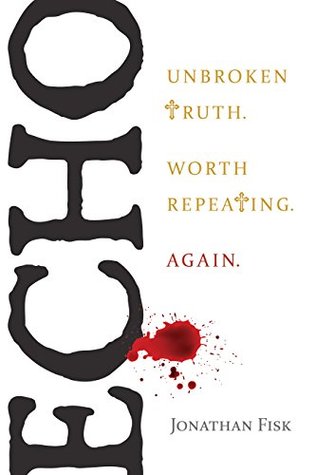Review: Echo

I just finished Reverend Jonathan Fisk's book Echo; below is the review I posted on GoodReads.
I remember confirmation class as being mostly dry
memorization culminating in an agonizing public examination while
clothed in white robes with red carnation corsages. The gifts and cash
after the fact were nice, and I used the bible with my name engraved on
it from my grandmother for 20 years, but I rarely (never?) felt inspired
to pull out my catechism again. Even as my adult faith deepened through
bible study and prayer, I rarely thought about my catechism. It was
interesting to me to realize that many of my other-denominational
friends had no such foundation for understanding scripture or their
Christian faith, and many of them even found such things as the Apostles
Creed vain human constructs; it was through their eyes that I began to
value what I had been taught, and to see these human constructs as
essential distillations of faith put into words. Enter "Echo" by Rev
Fisk. His book is written for just such readers as myself--those who
need to have their memory of the core beliefs of Christianity refreshed,
who need to see the teachings from confirmation class as eternal
truths.
Echo covers the 10 commandments, the Apostles Creed and the Lord's Prayer in a new and unique way. Yes, he tries to hide the fact that he's discussing the catechism but its apparent from the beginning. That said, it is far from stale and far from boring. He intentionally uses new language so that it doesn't have the "same old same old" sound of catechism class--"holification" instead of "sanctification", for example--words that make you sit up and think about what both the new word and the old word mean. "Sanctification" is a churchy, catechism-y word, but "holification" seems like simply a clear descriptor. These are part of what makes Rev Fisk's book appealing. Another is the way he ties concepts together, showing relationships between the major principles under discussion--like the "Don't take the Lord's Name in vain" of the 10 Commandments being clearly related to the "Hallowed by Thy Name" in the Lords Prayer. Toward the end of the book, he weaves many concepts together in a way that is both remarkable and a little overwhelming. I appreciated the insights but struggled to keep up.
The inclusion of graphics was helpful in making concepts more transparent--when Fisk was weaving multiple concepts together, the grids were very useful to me. The whole text is liberally sprinkled with little black and white drawings which are used consistently throughout as a visual representation of key concepts; a little man and a little woman, little numbers corresponding to the concepts under discussion. Very helpful....until they were not. Pictures can indeed be worth a thousand words, but added to the thousand words already being used, they weren't always helpful; I felt like some of the complex images showing interrelationships should actually have had explanations tacked next to them. Maybe I'll go back and scribble in notes. Learning through pictures is usually very helpful for me--I'm a doodler always looking to draw out relationships and include pictures when I take notes--so I think the intent of this approach is very valid, but not quite spot-on.
Another mixed bag is Fisk's writing style. On the one hand, his nearly stream-of-consciousness, chatting-together style is engaging, informal and unpretentious--approachable, friendly and enthusiastic. On the other hand, sometimes I feel like a stronger editorial hand might have taken some Pauline run-on sentences and broken them into more easily digested chunks. He sprinkles in a lot of short, emphatic sentences to break things up, along with bolded words for emphasis and specific, relevant scripture passages imbedded in the text. The combination of complex subject matter and long sentences did not always add clarity. The other mixed blessing is that because the writing is very readable, but the content demands additional thought and meditation, I found myself reading more than was maybe advisable at one sitting. In the same way its possible to gorge on good food, its possible to gorge on good writing and complex concepts. Probably wise to read in small doses. That said, the text is broken into subsections which should make that easy.
I like Fisk's weaving of contemporary references with lines from the catechism, the Creed and other Christian references, which is similar here to his Broken book. I also appreciated his desire to be very clear--he repeated concepts using synonyms or rephrased things in a new way in a subsequent paragraph to drive things home. At times this was a little overdone (I think the book could have been shorter), but overall effective at teaching through repetition--the point of the whole book.
I'm a sucker for a pretty book and this is one. I found it very visually appealing with the stark black, white and red cover. The pages are crisp and of good quality paper; the weight and dimensions of the book are nicely balanced, substantial without being a burden. The font and layout are easy to read. The margins would support note taking if I could bring myself to write in such a pristine-looking book. I have started buying a lot of books used, but am very glad I bought this one brand-new.
I recommend this book particularly for Christians who want a refreshing drink from the well of basic Christian teachings. Even if you have previously scoffed at these vain human constructs, give it a chance--after all, any book written about Christianity is a construct of some kind. Complex enough for a lifelong Christian, simple enough to complement a catechism class for a young person, this is an engaging book on timeless concepts that would edify any Christian reader.
For my as yet non-existent readership, here is a link to publishing house where Echo can be purchased.


Comments
Post a Comment